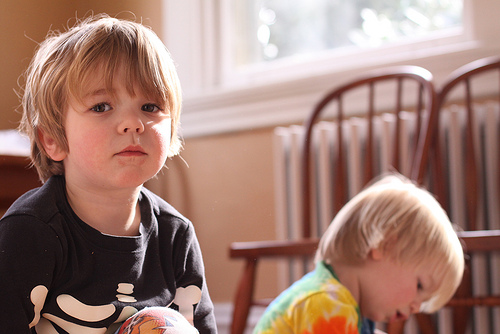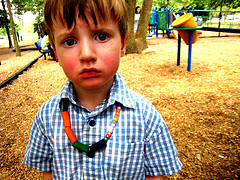I spent half my childhood in a home that practiced corporal punishment. My parents believed that children needed to be trained to be obedient and conform to expectations of the adult world. They also believed that bad behavior was a result of a sinful nature and they aggressively attempted to curb these supposed tendencies.
 I vividly remember those years. I earnestly prayed daily on my walk to school, asking god to allow me, for just one day, to be a good girl. It seemed that I simply could not get it right no matter how hard I tried. Even though I was an honor roll student, never dated or had sex, never went to parties, never drank or did drugs and tried to follow my parents rules, I still somehow managed to talk back, say something mean to my siblings or forget to complete a chore. I was constantly breaking a rule. I felt defeated, bad and unworthy.
I vividly remember those years. I earnestly prayed daily on my walk to school, asking god to allow me, for just one day, to be a good girl. It seemed that I simply could not get it right no matter how hard I tried. Even though I was an honor roll student, never dated or had sex, never went to parties, never drank or did drugs and tried to follow my parents rules, I still somehow managed to talk back, say something mean to my siblings or forget to complete a chore. I was constantly breaking a rule. I felt defeated, bad and unworthy.
During those same years, I began babysitting. Corporal punishment was not an option for the children I was watching. But I still had to keep them in line. I began to learn new methods for inspiring cooperation. I was very strict with my charges, as my parents were with me, but I was also very loving. I knew exactly what it felt like to be a child. I was still a child myself. I was amazed at how easily I could elicit good behavior from a child in a very short period of time without anger or severe punishments. I became committed to a philosophy of discipline that incorporated empathy, love and clear boundaries with nonviolent consequences.
I’ve noticed that many parents seem to want to utilize nonviolent and respectful parenting with their children. But they become concerned about how that fits in with discipline. How can I discipline my child if I am sympathizing with her feelings? The truth is respect and discipline are not mutually exclusive.
The point of empathy and respect for our children is not to eliminate discipline but to inform disciplinary choices.
Life is a matter of perspective. If we ask our child to get ready to leave the house and he pitches a fit, we can respond in any number of ways. But the internal dialogue we have about his outburst will greatly influence how we respond. If we think to ourselves, “Look at this kid. What a selfish brat. He never listens to me. He always has these tantrums. He just wants attention. He is so immature. He needs to just obey me and behave,” we will likely have a harsh and negative response to his behavior. But think about the response to our child if our thinking goes like this:
“Ah, poor guy. He was right in the middle of his game. I probably should have given him a little warning, but I was too busy. It stinks to get interrupted like that. He must be pretty disappointed and frustrated right now. I know I would be.”
This doesn’t mean that you don’t insist that he stop the activity and go to the store. But you can respond to your child and his response to your request with respect for his thoughts and feelings.
“Hey, kiddo. Sorry I didn’t give you a bit more warning. I realize you’re in the middle of something and it’s pretty frustrating to have to just stop what you’re doing like that. Unfortunately, we have a ton of stuff to get done today and I would get in a lot of trouble if I just left you here alone. So I’m kind of stuck. I have to bring you with me. Tell you what. How about we leave the blocks right where they are, instead of putting them away? That way, you can finish your tower when we get back home. I’ll try to be quick when we’re out.”
This isn’t just about acknowledging your child’s feelings. This is also about building a relationship with your child.
 Your child will remember that you saw his side of the situation. He will learn not only that you get him and how he feels, but also how to consider somebody else’s point of view. This is an important life lesson.
Your child will remember that you saw his side of the situation. He will learn not only that you get him and how he feels, but also how to consider somebody else’s point of view. This is an important life lesson.
Kids grow up. Maybe they forget how they were treated eventually. Maybe they don’t. But at least during the teen years they remember. And kids who have been consistently ignored, disrespected and demeaned will eventually respond in some way. Some rebel, some get depressed, some withdraw. But eventually, in one way or another, they stop accepting sheer force control.
None of these concepts are about perfection.
This is not about never losing your cool or always being a calm, controlled parent at all times. It’s about keeping your perspective. How we think about our kids has a tremendous influence on both how we feel about our kids and how we treat our kids. When my kids are making me insane, I try to think about why they are doing what they are doing before I decide what to do about it. This doesn’t just benefit them either. It benefits me. Getting to the real cause of the behavior eliminates it much, much faster.
Kids rarely misbehave for the sole purpose of misbehaving. There is almost always a simple human desire behind what they do. And their motivations are as natural as ours.
Think about a bad adult behavior. A lot of us drive too fast. I know I do. But how many of us drive too fast JUST because we WANT to break the law? We don’t get behind the wheel and think, “Haha! I’ll show them! I CAN do what I want and I WILL!”
 Most of us speed because we want to get somewhere faster, we are impatient, we are trying to beat traffic, we are late, etc. We have our own personal reasons. Sure, we know we shouldn’t do it, but we are not breaking the law JUST TO BE BAD. Kids are the same way. They have their own wants, needs and desires. They don’t want to break rules on purpose. But sometimes our rules conflict with what they want. So they try to get around them. But just like we appreciate a compassionate and understanding officer when we get caught speeding, kids appreciate compassionate parents when they get caught breaking our rules. Again, this doesn’t mean kids shouldn’t get consequences for breaking rules. It just means that we should keep perspective on why they are doing it. They are not evil little hellions. They are just people, trying to live their lives.
Most of us speed because we want to get somewhere faster, we are impatient, we are trying to beat traffic, we are late, etc. We have our own personal reasons. Sure, we know we shouldn’t do it, but we are not breaking the law JUST TO BE BAD. Kids are the same way. They have their own wants, needs and desires. They don’t want to break rules on purpose. But sometimes our rules conflict with what they want. So they try to get around them. But just like we appreciate a compassionate and understanding officer when we get caught speeding, kids appreciate compassionate parents when they get caught breaking our rules. Again, this doesn’t mean kids shouldn’t get consequences for breaking rules. It just means that we should keep perspective on why they are doing it. They are not evil little hellions. They are just people, trying to live their lives.
It is absolutely possible to be deeply connected, compassionate, gentle and also structured, predictable and undeniably in charge with your children.
I’m considered a very strict mom. Not just by my kids either. By my community as well. My children have tight restrictions on screen time and cell phones, early bedtimes, parental controls on nearly all electronics, and limitations on social outings. They are not allowed violent video games, not allowed to date and expected to do a fair share of household chores. Many of their friends do not have these requirements or responsibilities.
At the same time, I discuss issues and concerns with my kids openly. We negotiate their limitations as much as possible and I’m always willing to hear their side, though I may not change my position. When they behave in a way that I don’t like, I try to figure out why. If needed, I ask them, sincerely, what is going wrong with them that they are not complying with expectations. Then we come up with a plan to fix the problem. If that doesn’t work, we try something else.
I always have the final word in my home. My kids know this.
But our grasp on our children is tenuous at best. We have to remember that as we raise them to adulthood. There comes a time when they realize they don’t have to listen to us and they don’t have to live with us. They are able to leave. Our relationship with them will become all we have. Domination and force become absolutely useless and if a strong and loving relationship is not already there, we will have nothing left.
When my teens and I just can’t come to an agreement on an issue, I do have the final word. And they accept that. But this is only because of a lifetime of love and trust. My final word is powerful but it’s not, “Because I said so.” When we reach an impasse on an issue and just cannot agree (and this is truly rare) I reach for my version of the final word:
“Can you have faith in me on this, that I love you with all my heart, and I’m doing my best?”
So far, the answer has always been yes.
©UnnecessaryWisdom.wordpress.com 2013
Do you feel caught between the concepts of respecting your kids and disciplining your kids? What are your thoughts? Do you believe that respect enhances discipline? Detracts from discipline?
Related articles
- How to Discipline Your Child Without Yelling or Spanking (mathsexcel.com)
- Discipline for Kids and for Us (smoreforwomenblog.org)
- Newton’s Three Laws As They Apply to Parents (k8ogden.wordpress.com)

This article has so many important ideas, Would love to hear more about each of them. Wonderful piece!
Stephanie
LikeLike
Posted by stephanie katz levadi | June 4, 2013, 10:34 amThank you, Stephanie. I guess I’ll have to write more! 🙂 Zoe
LikeLike
Posted by unnecessarywisdom | June 5, 2013, 5:15 am